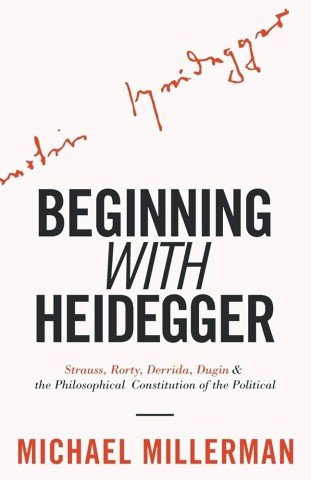Beginning with Heidegger
Millerman draws our attention to Heidegger as a source of key philosophical and political contributions that have shaped thought since his contributions in Beginning with Heidegger (2020). I came across Millerman via Dugin, some of whose books he has translated into English. This book is a slightly modified version of Michael Millerman's 2018 PhD thesis with the University of Toronto (available freely on the university's website). A few notes:
"One of Heidegger's main ideas is that the major concepts from the Western philosophical tradition are historically constituted, rather than universal or timelessly true. Today this appears trivial. But that is in part influence of Heidegger influence. Previously, concepts like "truth" and "right" were regarded as stable, universal, or eternal, and they served to an extent as foundational concepts used to justify social and political orders." (p. xi)
""The mere 'criticizing' from any arbitrary standpoint, the counting up of errors...on the 'basis' of a philosophy that is 'free of standpoint,'" he continues, "is not so much wrong as it is simply childish." Thus, neither the criticisms of an arbitrary standpoint, nor the mere identification and enumeration of errors are required. Rather, the need is for an "essential correspondence" as "confrontation," that is, to test, or to be tested by "the claim of an essence of truth" that a given thinker and we ourselves might stand under, thus to "gain clarity about ourselves" (p. xxix)
"Heidegger never elaborated a "political theory" out of the grounds of inceptual thinking. Despite a few remarks on Germany, Russia, and America, he never constructed a comprehensive "theory of international relations." And although he relates the questioning of being to the question of "who" a people are, his writings are without extended thematic construction of something like an "existential theory of society." By contrast, Dugin extends Heidegger in precisely these directions. Importantly, he extends his criticisms of Nazi "metaphysics," too. The proponents of a political philosophy that leaps into another beginning criticize Nazism as incompatible with inceptual thinking, following Heidegger's own muted theoretical criticisms of Nazism." (p. xliii)
"Heidegger's importance for political theory is immense. but the access to Heidegger required for political theory is not easily obtained. It requires a destruction, or deconstruction, of both post-Heideggerianism, which lies mainly on the political left, and anti-Heideggerianism, which characterizes the political liberal right known for invoking natural right against history. Except for complete indifference to philosophy, perhaps the greatest obstacle blocking access to Heidegger is the view that his philosophy is Nazism or at the very least abets it. While thralldom to certain themes in Heidegger can lend itself to uncritical sympathies for various elements of a Nazistic worldview, non-Nazi political zealotry concerning Heidegger can also lead to philosophical blindness or even to war against philosophical inquiry. Both risks must be avoided, and both the philosophical and political must receive their due. When they do, political theory can become more than an academic discipline and can serve as an invitation to conversations and configurations, transformations and constitutions, turning and events." (p. 214)

